If you’ve just found a crack in your foundation or heard the words “foundation issue” during a home inspection, first of all, take a deep breath. You’re not alone. A foundation repair is something many homeowners face, and the good news is most foundation problems can be repaired. And yes, you have options.
I know this because we faced this same issue two weeks after moving into our new home.
After receiving the gut-punching news we had a major foundation problem, I struggled to find resources and help. All my Google searches just turned up foundation repair companies trying to get me to schedule a free estimate, when what I really needed was support and more information.
That’s why I put together this Foundation Repair Survival Guide for Homeowners.
Written by a fellow homeowner with no agenda, and breaking down exactly what to expect, who to call, how much it might cost, and what your first step should be.

Plus links to all the trusted resources we used during our own foundation repair process last year.
Whether you’re looking at a tiny crack or a major structural fix, here’s what you need to know.
- Our Story: An Unexpected $42,000 Foundation Repair
- You Found A Crack In Your Foundation. Now What?
- Who To Call First
- Who Do You Hire For Foundation Repair?
- How To Find a Good Foundation Repair Company
- How Much Does A Foundation Repair Cost?
- How Do You Pay For An Expensive Foundation Repair?
- How Long Will It Take To Fix?
- What Kind of Repair Do You Need?
- Do You Need a Permit?
- Can You DIY Foundation Repairs?
- Step-By-Step How To Get Your Home's Foundation Fixed:
- Key Takeaways: The Most Important Things To Know For Your Foundation Repair
- Final Thoughts: You’ve Got This
Our Story: An Unexpected $42,000 Foundation Repair
Our basement flooded the day we moved in to our new house. Two weeks later, I noticed a leaning basement wall and cracks all around the foundation.
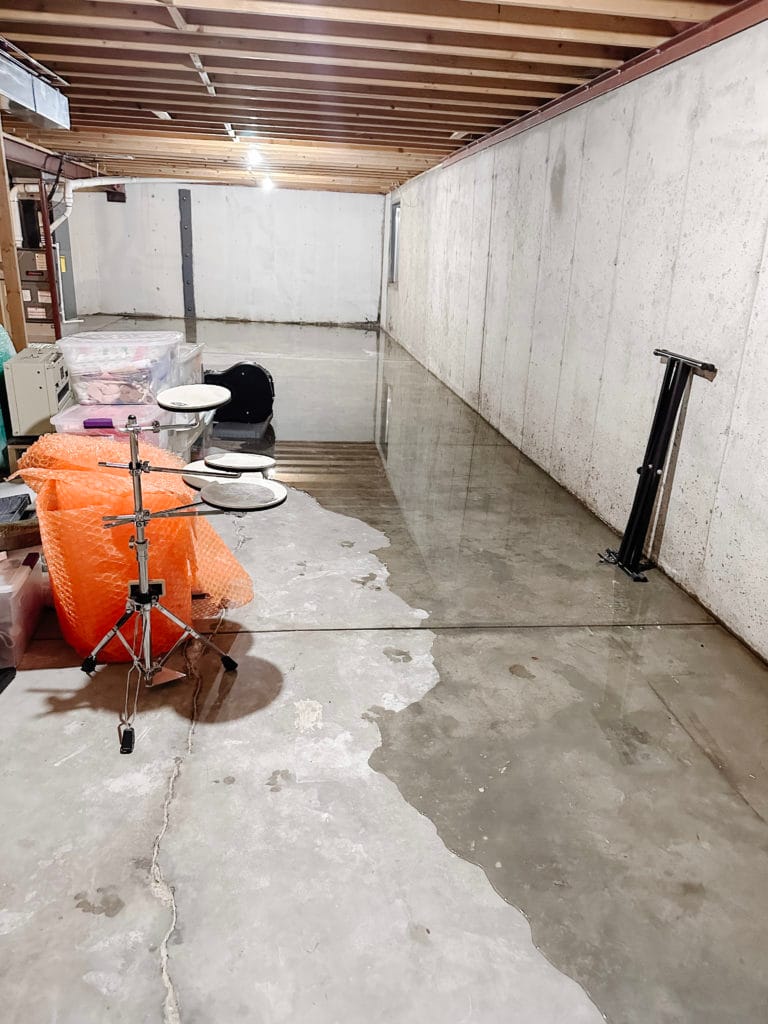
We bought the worst house on the block, so we knew it would need some repairs.
But after moving in, we learned this house had been abandoned for over a year and was formerly owned by a hoarder.
Most appliances were broken (AC, dryer, dishwasher), every sink was leaking, and the floors were filthy.
We were suddenly drowning in unexpected home repairs and our savings was seriously depleted.
And then we discovered a major foundation issue.
It was terrifying.
Why hadn’t our home inspector caught this? Why didn’t the previous owner inform us? Who’s at fault here? What do we do now? How do we pay for this? Who do we even call to fix it?!
My attempts at googling foundation repairs just kept turning up various foundation repair companies blogs and quote forms for free estimates.
But I needed REAL stories from REAL people who had encountered this problem and could give me advice on what to do next.
I needed some assurance that it would be okay, that we’d get through it, that our house wasn’t about to fall down and we’d have to move again.
Instead we floundered our way through our foundation repair, were quoted $42,000 in repairs (more on that below), and learned a few lessons along the way.
So now I’m turning around and giving as much information as I possibly can to help other homeowners facing this issue.
We learned a lot, but most importantly: foundation issues are more common than you think.
And they are fixable!
You Found A Crack In Your Foundation. Now What?
First, don’t panic. Not all foundation cracks are problematic.
Hairline cracks in concrete are common and usually harmless.
But larger gaps, stair-step cracks in brick, or horizontal cracks in foundation walls could point to something more serious.
If your doors are sticking, your floors feel sloped, or windows suddenly won’t close, your foundation could be shifting significantly and it’s time to take a closer look.
Immediately Start Documenting The Crack
Start by documenting the crack (photos help!) and monitoring it over time.
If your basement is unfinished, measure and mark the cracks with a piece of chalk. Mark where they start and stop, and how wide they are, along with the date to track how quickly it’s changing.
If the wall is leaning, attach a piece of string to the top of the wall and let it hang down until it touches the floor. Mark how far inwards the wall is leaning, and then remeasure again later to see if the wall has moved in either direction.
If it grows or if there are other signs of shifting, it’s time to get a professional opinion.
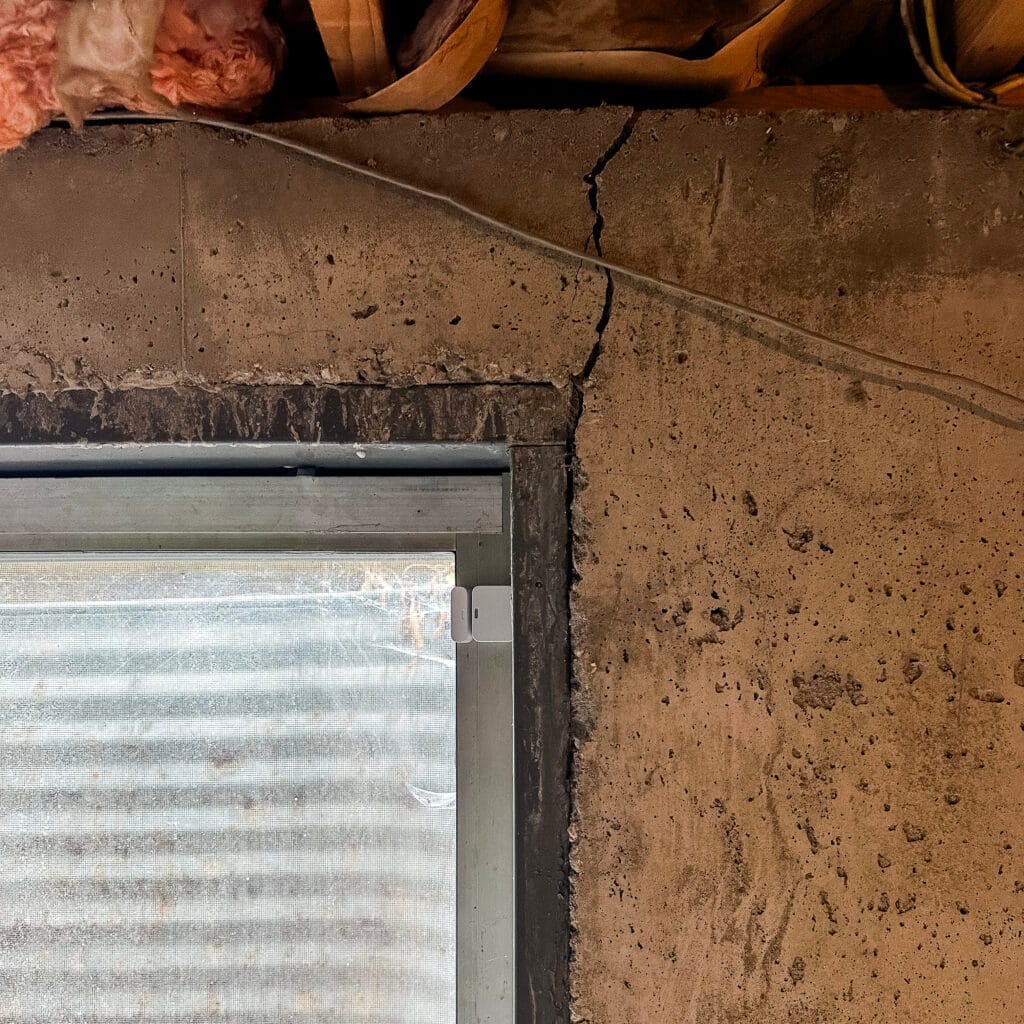
Evaluate The Type Of Crack (Hairline vs Structural)
Some cracks are normal and non-issues. Hairline cracks (super tiny cracks) are common and non-structural. Different types of cracks appear for different reasons (like hydrostatic pressure from insufficient water mitigation or improper soil preparation). They also require different types of repairs. Here are the most common types of foundation cracks:
- Vertical Cracks
- Horizontal Cracks
- Diagonal Cracks
- Stair-Step Cracks
- Shrinkage Cracks
- Expansion Cracks
- Settlement Cracks
A good structural engineer or foundation repair company will evaluate the type of crack, measure it’s severity, and recommend the type of repair you need for it.
Helpful Resources:
- Types of Foundation Cracks – https://renco.ca/types-of-basement-foundation-cracks/
- Hydrostatic Pressure: https://www.groundworks.com/resources/how-to-relieve-hydrostatic-pressure-around-your-basement/
Check For Warning Signs (Bowing walls, Water, Gaps)
Look around your house for any of these common symptoms.
- Moisture, visible water spots, flooding issues, or mold
- Uneven floors
- Sticking doors
- Visible drywall cracks
- Gaps appearing – Between baseboards and flooring or between walls
- Bowing walls
Helpful Resources:
- When to worry about foundation cracks: https://www.gothrasher.com/about/news-and-events/48373-foundation-cracks-when-to-worry.html
- Common foundation repair problem signs: https://www.groundworks.com/solutions/foundation-repair/problem-signs/
- Causes of foundation problems: https://foundationprosfl.com/why-is-there-a-crack-in-my-foundation-wall
If you notice any of these problems, I highly recommend getting it inspected.
The worst thing you can do is leave it and let it get worse! You may end up with an even bigger (and way more expensive) repair down the road.
Who To Call First
Do NOT go straight to a foundation repair company.
You need an unbiased opinion first, and most repair companies are looking to sell their services and solutions.
They will almost always tell you you have a huge problem that needs fixing immediately and may take advantage and oversell you.
Call a licensed structural engineer to get an unbiased assessment first. They’ll evaluate the situation and tell you whether you need a repair, and if so, what kind.
A structural engineer typically charges between $300–$800, but it’s money well spent.
They’re not trying to sell you anything. They’re just going to give you the facts.
You can find a local pro or ask your home inspector for a referral.
Some foundation repair companies will sub-contract with independent structural engineers to inspect the foundation and create a report. This is great! And a good indication that repair company is honest and has your best interests in mind.
Helpful Resource:
- Why hire a structural engineer for foundation problems: https://www.thisoldhouse.com/foundations/reviews/structural-engineer-foundation-inspection
Who Do You Hire For Foundation Repair?
If your engineer recommends repair, the next step is hiring a qualified contractor or repair company.
Look for companies that specialize in foundation repair, not just general contractors or concrete repair companies.
Ask for:
- Proof of licensing and insurance
- A clear scope of work
- Written estimates
- Warranty details (lifetime warranties are best)
Get multiple quotes and ask what’s included—permits, inspections, post-repair cosmetic fixes, etc.
Avoid companies that push high-pressure sales or claim your home is going to collapse tomorrow.
And research their solutions before you agree to them.
One company told us we needed a waterproof vapor barrier around our foundation walls, but after looking at our city’s building code recommendations, we learned that water vapor barriers in our area will trap mold and create bigger problems.
Unfortunately, big repair companies are looking to make a buck off of you and may not have your best interest in mind.
Be cautious and get multiple quotes and opinions! Look through google reviews and ask for recommendations from people you trust.
It could save you thousands of dollars and major problems in the future.
How To Find a Good Foundation Repair Company
The first repair company I called (Groundworks of Northern Colorado) before hiring a structural engineer quoted us $42,000 worth of repairs. They scared us into how extensive our issues were, recommended a whole new waterproofing set up in our basement, tile drain system, multiple sump pumps, water vapor barriers, window well taps, excavation around the house, extensive foundation repairs, etc. etc.
Then the gave us 3 days to sign a contract or we’d lose their 20% off seasonal discount.
We now know that they quoted us way beyond the level of repair that we actually needed!
They were helpful and knowledgeable, yes.
But their solutions were absolutely beyond what we were looking for.
In fact, we found a company who could do it for $14,000 instead.
Signs a foundation repair company is over-quoting you:
- Their estimated cost is above and beyond what you expected
- They’re recommending services and installations you didn’t ask for, for reasons that don’t make sense
- They pressure you to say yes with discounts if you sign contracts the first 1-3 days
- Very “salesy” and have a very in your face approach
- They recommend solutions that don’t make sense for your area
To find a good foundation repair company, here are some options..
Start with a Google search “foundation repair near me” and look through websites and reviews.
Look for a local company who knows the unique qualities of the soil in your area. For example, Texas soil is different than Colorado soil and requires different solutions! Texas soil is dry and rocky, whereas Colorado soil is expansive and clayish. National chains (like Groundworks) might recommend the wrong solutions because they aren’t necessarily specialized to your area. This was our experience!
Ask someone you trust for a recommendation. If you know someone who’s had a foundation repair done, ask about their experience and what they’d do differently.
Don’t be afraid to call around and ask for recommendations. Because we were new to the area (and to Colorado soils), we didn’t know anyone to ask for a recommendation. So I started calling companies related to concrete repair, foundation repair, basement waterproofing, structural repairs and just asked for help and recommendations. It pointed us in the right direction until we found the right company!
Look up local contractors on websites like these:
- Angi’s foundation contractors quotes – https://request.angi.com/service-request/category/10287?kw_id=foundation%20repair%20cost
- Home foundation repair pros contractor lookup: https://homefoundationrepairpros.com/
- Foundation and basements Co contractor lookup: https://foundationandbasements.com/
Ultimately, you may not be able to get a good sense of the quality of work a company can do. Do your best to vet their knowledge and expertise, and set yourself up to be protected just in case with warranties/guarantees on the work they do.
Positive signs to watch for in a good foundation repair company:
- They are genuinely helpful and empathetic to your problem.
- They make recommendations for what you do and DON’T need done.
- They don’t pressure you with discounts and contracts right away. They let you think about your options, ask questions, and take your time.
- They have positive reviews on Google and/or their website.
- They offer warranties or guarantees for their work.
- They give you a transparent break-down of the costs involved.
- They set clear expectations for the timeline and the actual work they’ll do.
- They will manage the project start to finish for you (permits, inspections, paperwork, etc.)
- They understand the local soil and the unique problems that arise because of it. They offer solutions that are in line with your local building codes and recommendations.
How to protect yourself and your home in this process:
A foundation repair is a huge, expensive repair with lots of risk. I’d recommend putting some safe-gaurds in place during this process to protect yourself, your home, and your finances.
- Hire a structural engineer and get multiple opinions on the problem and the solution you need. This gives you confidence you’re making the right decision.
- Always get a warranty or guarantee of the work that’s done just in case it’s done poorly or future issues arise. This gives you peace of mind that your money won’t be wasted and you won’t be on the hook to pay for any problems that arise.
- Be sure to read all the fine print of any contract sent your way.
- Be smart about how you pay for it (more on that below).
How Much Does A Foundation Repair Cost?
Costs vary wildly depending on the severity of the damage, the size of your home, and the type of foundation. But here are some ballpark numbers:
- Small cosmetic repairs: $500–$2,000
- Moderate repairs: $2,000–$10,000
- Major structural repairs: $10,000–$30,000 or more
If you need a new sill plate (like we did), that alone can cost $1,000–$4,000 depending on labor and access. You might also need to repair drywall, floors, or landscaping afterward.
If excavation is needed around the home, you may need to remove decks, patios, and landscaping for access. Plan the cost to replace those.
There may be additional costs for permits in your area.
Your repair company may factor in all of these costs for you! Check with them for a cost break down so you know what to expect.
How Do You Pay For An Expensive Foundation Repair?
Foundation repairs usually aren’t covered by homeowners insurance unless caused by a specific covered peril (like a natural disaster).
But you still have options!
Figuring out how to finance this major repair was terrifying for me. Especially because we had just moved and had already shelled out way more money than we expected in our home.
Here are the options we considered for our own foundation repair:
Home equity loan or HELOC
- Pro: Uses your home’s equity to finance the repair. Allows you to borrow a significant amount of money if needed, without a ton of restriction.
- Con: Variable interest rates and closing costs can be expensive. You may need an appraisal. You also use your home as collateral in the loan, which is risky if you can’t make payments.
- Resource: https://www.experian.com/blogs/ask-experian/what-is-a-home-equity-line-of-credit-heloc/
FHA Title 1 Home Improvement Loan
- Pro: You don’t need equity in your home to quality, can borrow up to $25,000, and is designed to help homeowners with repairs like this.
- Con: You have to quality and can only be used for certain improvements.
- Resource: https://www.experian.com/blogs/ask-experian/how-to-qualify-for-fha-home-improvement-loan/
Personal Loan or Contractor Payment Plans
- Pro: Easy to access. You can choose your lender.
- Con: May have high interest payments.
Cash-Out Refinance
- Pro: Allows you to access your home’s equity for cash in your pocket, and you can use this cash however you want.
- Con: Requires you to refinance your home with a new and higher mortgage.
- Resource: https://www.experian.com/blogs/ask-experian/what-is-a-cash-out-refinance/
Savings
- Pro: You won’t take on debt, it won’t affect your credit score or monthly budget, it avoids paying any interest from a loan, and you can pay for it upfront and be done.
- Con: These repairs can be really expensive and might deplete your savings and put you at financial risk.
0% interest rate credit card
- Pro: You can borrow a significant amount of money with no interest payments, and you can transfer balance to another credit card later.
- Con: You may not qualify if you have bad credit, and you take on credit card debt.
- Resource: Credit Cards with 0% interest: (we used Wells Fargo and had a great experience) https://www.fool.com/money/credit-cards/landing/zero-intro-apr-cards/
There may also be grants in your area for repairs like this.
We chose to put this repair on a 0% interest rate credit card through Wells Fargo.
For a $14,000 repair, our monthly payment is only $100 a month.
Although it sucks to add that into our monthly budget, it’s affordable and doesn’t put us at financial risk like some other options would have. Once our card’s interest rates kick in (after 21 months), we plan to pay a small fee and transfer this balance to a different 0% interest rate credit card.
This will be cheaper than paying monthly interest on a HELOC or personal loan. And it didn’t drain our savings.
How Long Will It Take To Fix?
Most repairs follow this general timeline:
- Inspection and planning: 1–2 weeks
- Contractor estimates and scheduling: 1+ week
- Obtaining Permits: 4+ weeks
- Repair work: 2–10 days (longer for major projects)
You may be able to stay in your home during the process, but expect noise, dust, and some disruption. Permits may be required depending on your city and the scope of work. The city may require inspections before, during, and after the repair. A good repair company will schedule those on your behalf.
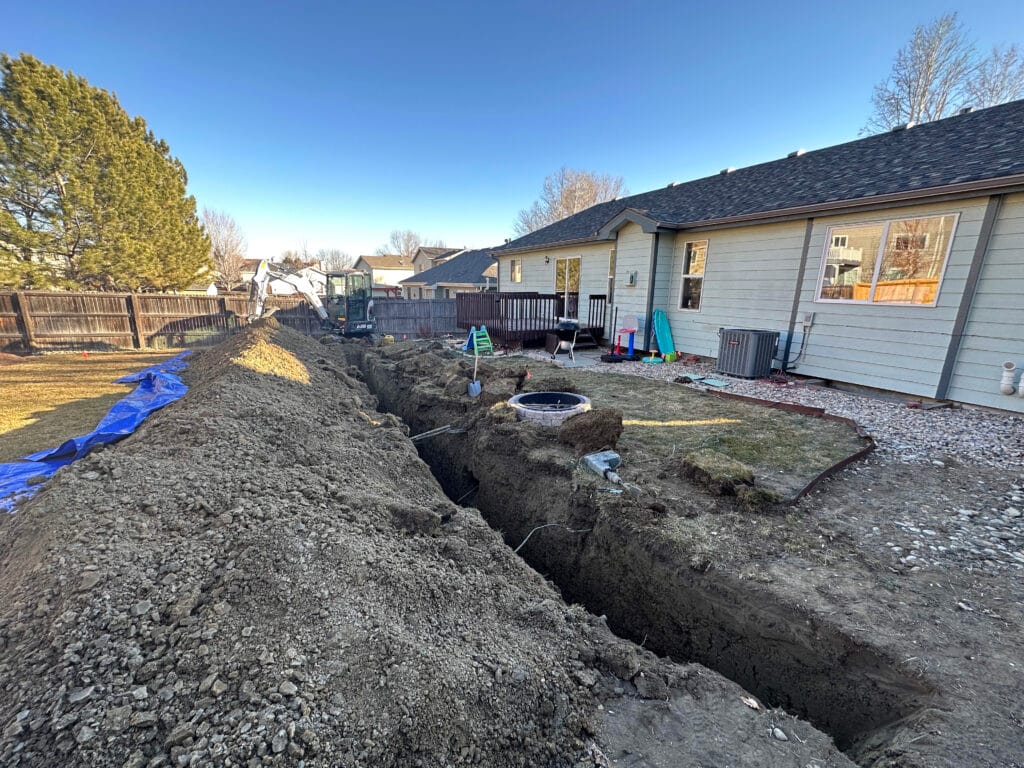
What Kind of Repair Do You Need?
Your engineer or contractor will recommend a solution based on your home’s structure and soil conditions. Common foundation repairs include:
- Jack supports for sagging
- Carbon fiber straps for wall reinforcement
- Concrete Piering or underpinning
- Helical Piers for sinking foundations
- Push piers for settling foundations
- Wall anchors for leaning foundations
- Foam injection or mudjacking for sinking slabs
- Epoxy injection for small cracks
- Waterproofing or water mitigation
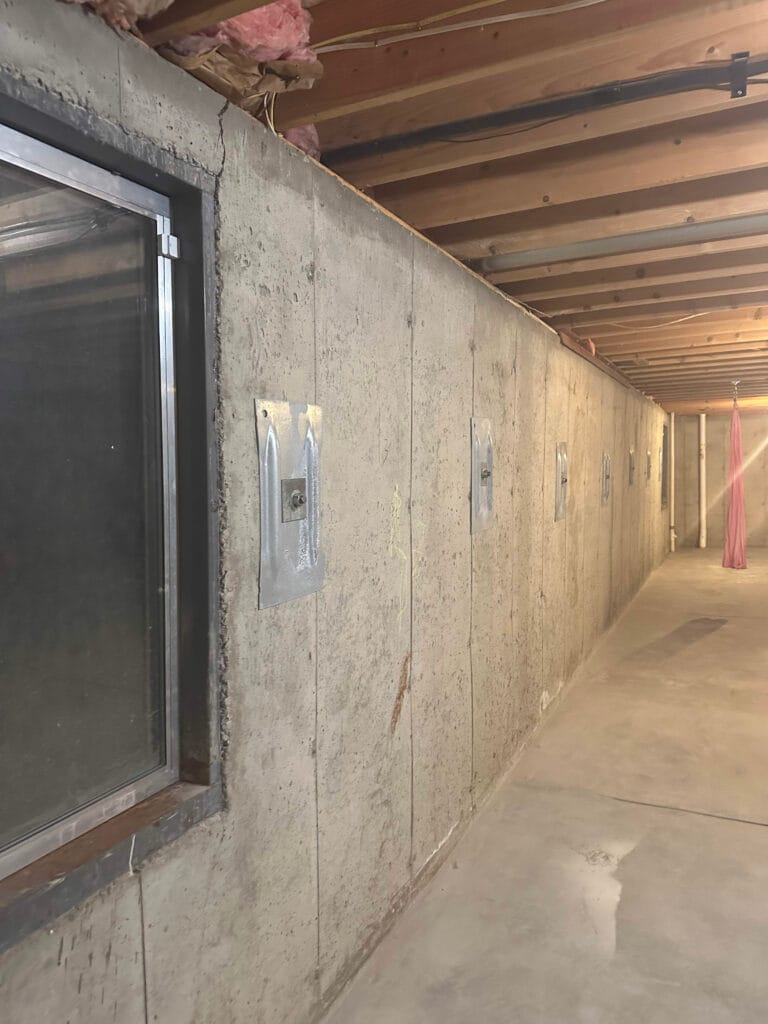
Helpful Resource:
- Average costs for each type of repair, pro’s and con’s, and more info on foundation repairs: https://www.coloradostructuralrepair.com/foundation-resources/11-best-foundation-repair-methods
Do You Need a Permit?
In most cities, yes! Especially for structural work. Check with your local building department before starting. Your contractor should handle this, but it’s smart to ask.
Can You DIY Foundation Repairs?
Maybe. Small cracks that aren’t growing can often be filled with sealant. You can find crack repair kits at most hardware stores.
But if the crack is wider than 1/8 inch, or there are signs of movement, you need a pro. Structural issues are not a weekend or DIY project.
Foundation issues are serious and best handled by licensed professionals. They’ll take on the risk and liability for you, and it puts you in a better spot with your home insurance and lenders if any other issues arise.
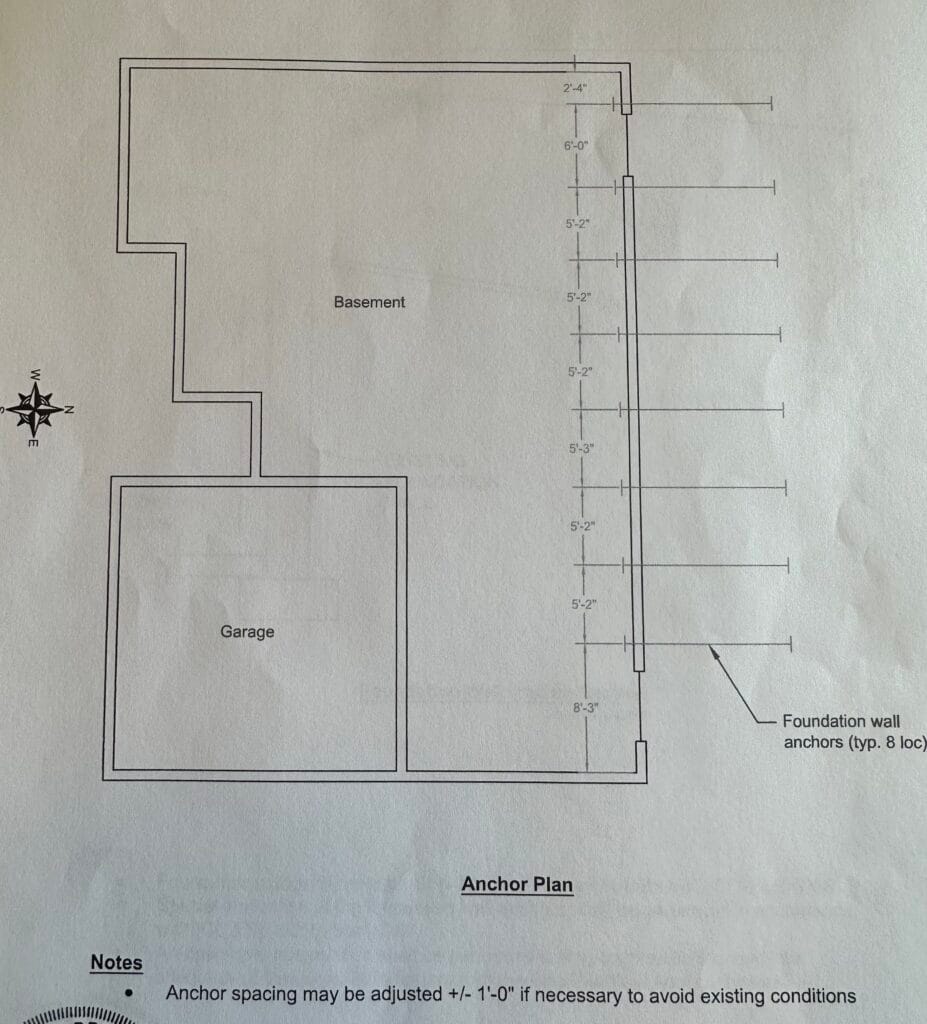
Step-By-Step How To Get Your Home’s Foundation Fixed:
- Measure and document the crack.
- Call a structural engineer for an evaluation.
- If a repair is needed, hire a trustworthy repair company.
- Finance/pay for the repair.
- After the repair, continue monitoring for any issues and take preventative measures for future problems (like water mitigation).
Key Takeaways: The Most Important Things To Know For Your Foundation Repair
- Hire an independent structural engineer first for their unbiased, professional opinion on what repairs you actually need.
- Measure and track your foundation cracks.
- Do not trust your home inspector to catch foundation issues.
- Be sure to vet the company you hire, and get lifetime warranty on the repair just in case.
- Always get multiple quotes and don’t get suckered into high-pressure contracts from big companies who are over-quoting your needs. Your house won’t fall down tomorrow. Take some time and hire the right people.
- Do your own research on their suggestions and ask tons of questions.
- I recommend a 0% interest rate credit card financing option (cheapest option) if you quality.
- Yes, this is stressful! Join a facebook group and find other homeowners who get it and can support you.
Final Thoughts: You’ve Got This
Foundation problems can feel like the end of the world, but they’re not. Thousands of homes are repaired every year, and yours can be too.
Start with a structural engineer, ask the right questions, and move one step at a time. You’ll get through this.
Have a story or question about foundation repair? Leave a comment below or send me a message. I’d love to hear from you!
Read more >>
Wall Sill Plate Repair For Our Leaning Foundation
Installing Wall Anchors: Step-By-Step
8 Things I’d Do Differently Before Buying A Fixer Upper Again






